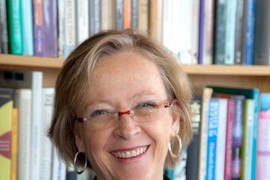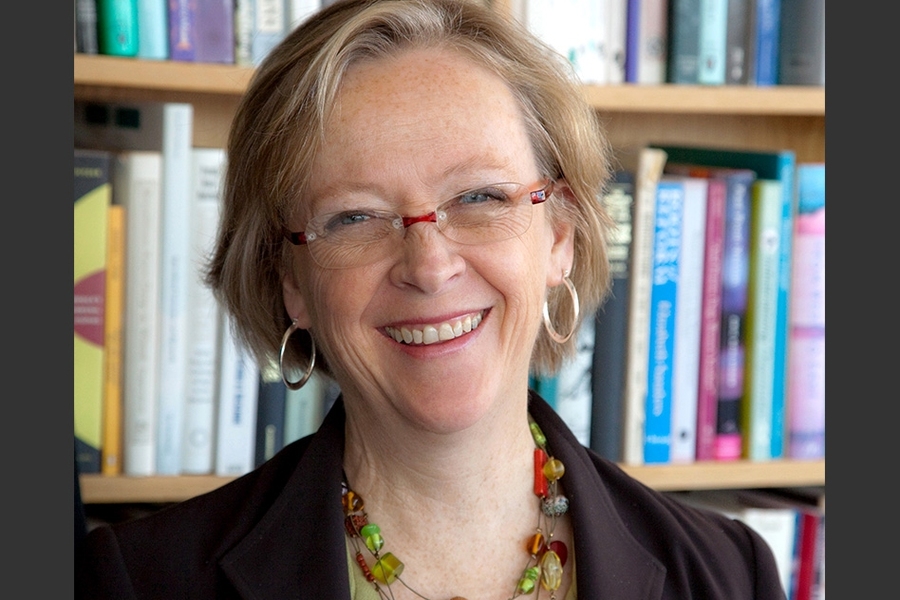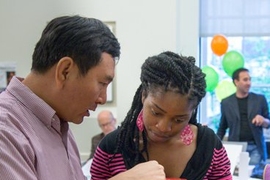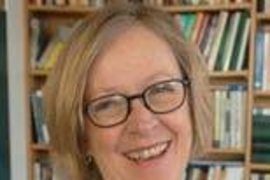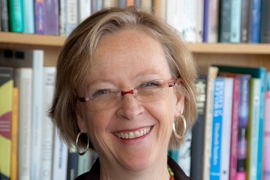Deborah K. Fitzgerald announced today that she will step down as Kenan Sahin Dean of MIT’s School of Humanities, Arts, and Social Sciences (SHASS), effective July 1, 2015. Provost Martin Schmidt shared the news in an email to the MIT community.
Fitzgerald, who has served as dean of SHASS since 2007, and in the two preceding years as associate dean and acting dean, will return to her faculty position as a professor of the history of technology in MIT’s Program in Science, Technology, and Society.
“Under Deborah’s inspired leadership, SHASS has maintained the highest standards of academic excellence throughout its departments, centers and programs and has become an increasingly important contributor to the Institute’s overall capacity for innovation in teaching and research,” Schmidt wrote in his letter. “In particular, she was devoted to strengthening the core undergraduate education requirements in the humanities, arts, and social sciences, and among her achievements was the recent restructuring of several academic units in the humanities.”
“Deborah Fitzgerald has been a tremendous leader for SHASS and an influential advocate for the humanities, arts, and social sciences well beyond our campus,” MIT President L. Rafael Reif says. “She understands that no matter how rigorously we educate our students in science and engineering, it is when we teach them about human culture and complexity that we truly equip them to change the world. For me personally, she has also been a wonderful colleague and counselor — wise, clear, candid, forward-looking, and deeply in tune with MIT."
As dean, Fitzgerald has led a school of 170 faculty members in 13 fields of study: anthropology; economics; political science; global studies and languages; history; linguistics; literature; comparative media studies/writing; music, philosophy; theater arts; science, technology, and society; and women’s and gender studies. SHASS, which teaches all MIT undergraduates, is also home to seven graduate programs, and to many labs and centers, including the Abdul Latif Jameel Poverty Action Lab; Center for International Studies; HyperStudio (digital humanities); Security Studies Program; Knight Science Journalism Fellows; Game Lab; Open Documentary Lab; and Global Health and Medical Humanities Initiative.
“Serving as dean of this school, at this great Institute, has been a profound and humbling privilege,” Fitzgerald says. “It has been an enormous pleasure to collaborate with distinguished and dedicated colleagues from many disciplines, and with alumni from around the globe, to help advance MIT’s research and educational mission in the humanities, arts, and social sciences.”
Boosting graduate and undergraduate education
During her tenure, Fitzgerald has been committed to strengthening resources for SHASS’s distinguished graduate program. She also initiated restructuring of MIT’s academic requirements in the humanities, arts, and social sciences (HASS), improving its approach to HASS core education; re-energized undergraduate education in SHASS, including a program for developing innovative new classes; and spearheaded restructuring of several SHASS academic units to create a single, stronger unit centered on media studies and writing.
Fitzgerald has also strengthened the Institute’s offerings in international education. She was a member of the MIT Global Council that produced a 2009 report, “Mens et Manus et Mundi,” that explored goals for the future of global education and research at MIT. And she has supported the continued growth of the SHASS-based MIT International Science and Technology Initiatives (MISTI), the Institute’s international education program, which prepares students to collaborate and lead around the globe. MISTI connects MIT students — some 5,500 to date — to fully funded internship, research, and teaching opportunities in 18 countries.
The MISTI experience begins with preparatory coursework in the languages and cultures of the destination countries. “Giving MIT students deep knowledge of other languages and cultures, and the capacity to be global citizens and wise leaders, is vital to a 21st century education — and critical to the Institute’s leadership position,” Fitzgerald has said.
Advancing the arts, empowering students
Fitzgerald also helped spur advances in MIT’s arts programming, including the launch of the MIT Center for Arts, Science, and Technology (CAST), a joint initiative between SHASS, the MIT Office of the Arts, and the School of Architecture and Planning. Established in 2012 with a $1.5 million grant from the Andrew W. Mellon Foundation, CAST was founded to further MIT’s leadership in integrating the arts into the curriculum and research of institutions of higher learning. Recognizing the powerful place that the performing arts have in the creativity, growth, and success of MIT students and alumni, Fitzgerald championed plans for a performing arts facility in music and theater at MIT.
To further share significant ideas, news, and research from SHASS, Fitzgerald established an in-house communications effort, creating a feature-rich website; a monthly digest, “Said and Done”; a permanent exhibition — “Great Ideas Change the World” — in Building 14N; active social media channels, including the Twitter account @SHASS4Students; the Listening Room, a curated, free, web-based collection of MIT’s finest student and faculty music; and the Tour de SHASS, an annual event at which MIT students meet and talk with SHASS faculty and explore the school’s academic offerings through a travel-themed expo.
An MIT faculty member since 1988, Fitzgerald is a leading historian of American agriculture and author of the award-winning “Every Farm a Factory: The Industrial Ideal in American Agriculture” (Yale University Press, 2003). Fitzgerald is a past president and member of the Agricultural History Society, and a member of the Organization of American Historians and the Society for the History of Technology.
Speaking of her mission in returning to teaching MIT students, Fitzgerald said, “As educators, we know we cannot anticipate all the forms our students’ future challenges will take, but we can provide them with some fundamentals that will be guides for the ongoing process of exploration and discovery. We can help shape their resilience, and prepare them to analyze and problem-solve in both familiar and unfamiliar situations. Calling on both the STEM and HASS disciplines, we aim to empower our young students, thinkers, and citizens with superb skills, habits of mind, and experiences that help them serve the world well, with innovations, and lives, that are rich in meaning and wisdom.”
In his email to the MIT community, Schmidt said that he intends to appoint a faculty committee in the near future to advise on the selection of the next dean of SHASS. He also asked for insights and suggestions from the MIT community to help identify the best candidates for the next SHASS dean. All correspondence sent by email (shass-search@mit.edu) or letter (Room 3-208) will be treated as confidential.
